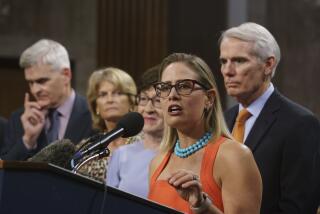Into the Back Room
- Share via
It is no wonder that Sen. Bob Packwood (R-Ore.) has chosen to take the Senate’s tax-reform discussions into the back room. In open session during recent weeks a majority of members have voted almost without shame to pass out new goodies in the name of tax reform and to take present loopholes and stretch them out of all reason. But, then, the committee’s chances of producing a credible tax-reform program were frozen at zero at the very outset by Chairman Packwood’s vow to retain special tax advantages for his home-state timber industry.
One of President Reagan’s standards for tax reform was a bill that would promote economic growth. Like it not, that’s called national economic planning. Even Richard G. Darman, the deputy Treasury secretary, acknowledged that you have to pick and choose among special tax breaks for certain industries, depending on the sort of economic result that you want. But the committee seems to have the process turned around: Choose the tax benefits that will help your own state, and--behold!--there’s an economic policy.
As Times staff writer Tom Redburn reported, the situation became so Balkanized that Sen. George J. Mitchell (D-Me.) pointed out that the committee’s proposal would favor trucks carrying baseball gloves over those hauling hamburger buns. Sen. Daniel Patrick Moynihan (D-N.Y.) described the process as one of separating industrial winners from losers and then betting on the losers. The result, he said, was a 19th-Century industrial policy. Not only do we not need a 19th-Century industrial policy, but also such an approach hardly conforms to Reagan’s other tax-reform criteria of fairness and simplicity.
Curiously, the Administration seems to be generally happy with the result so far, probably because Packwood has maintained the President’s most sacred specific provision of tax reform--a maximum personal income-tax rate of 35%. The Administration even is willing to go along with selective increases in excise taxes if needed to hold the rate at 35% (the House version has a 38% maximum rate) and to make sure that the plan raises enough money to offset the revenue lost through rate reduction. The Administration should be commended for its willingness to dip its toe into the chilly pond of tax increases, but there are several problems with its effort.
More than half the 100 senators already have announced opposition to the higher taxes on gasoline, cigarettes and alcoholic beverages. The Administration message, delivered by Assistant Treasury Secretary J. Roger Mentz, came after the affected industries launched a massive media campaign against any increases. The excise levies fall far short of offsetting all the giveaways that the committee has granted. And new taxes, if any, should be diverted to the most serious challenge facing Congress and the Administration--reducing the budget deficit.
Mentz’s argument for a boost in excise taxes was compelling, but he delivered it to the wrong committee. He should have gone before the Senate Budget Committee, which is struggling to put the country on the road to balanced budgets and could use some encouragement from the Administration.
The Senate Finance Committee has made such a mishmash of tax reform in public sessions that one wonders with fascination and anxiety what it might come up with in private meetings. It might surprise everyone and consider the folly of ordering more tax cuts for the wealthy. Maybe members will find the courage to relent on home-state protectionism, even Oregon timber. Perhaps the committee will have the good sense to take a look at some of the real tax-reform proposals that have been before it for several years, such as that of committee member Bill Bradley (D-N.J.). But unless it undoes much of what it has done to date, the committee should decide that it has wasted enough time on tax reform in 1986 and get on to other matters, like the deficit.
More to Read
Get the L.A. Times Politics newsletter
Deeply reported insights into legislation, politics and policy from Sacramento, Washington and beyond. In your inbox twice per week.
You may occasionally receive promotional content from the Los Angeles Times.










